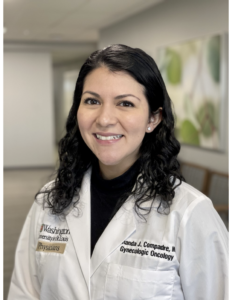SGO Wellness Blog: A Fellow’s Reflections From a Sleepless Night | Amanda Compadre, MD

Amanda Compadre, MD
I was leaving the hospital at 11:00 p.m. when I got a call for an emergent consult—my fourth add-on case of the week. As my attending and I unscrubbed, I realized I was tired. It was 3:00 a.m. and we had rounds at 6:00 a.m. Two nights prior, I had also been awake in the middle of the night evaluating an unstable patient, leading to another night of broken sleep. But alas, I am not new to sleep deprivation. In college, I had pulled all-nighters, I had done it again as a chemistry teacher, and I worked plenty of 24-hour shifts in residency. Most recently, I even survived the newborn phase as a mother of twins. But Fellowship felt different.
The thought of working, let alone operating, all day after being awake for more than 24 hours was overwhelming. It felt unsafe. Just as I was thinking of the best way to let my attending know I was planning on missing his first case to take a nap, he turned to me and said, “Why don’t you go home and rest and come back when you wake up.I’ll cover Rounds.” Was he really sending me home? I was relieved—somewhat surprised—and did exactly as I was told. As I was falling asleep in my bed I kept thinking am I a bad fellow? Will the patients be okay without me? Despite my worries, everything was fine when I awoke. All the patients were well cared for. It turns out that the academic gynecologic oncology practice can survive without a fellow for a few hours.
As a gynecologic oncology fellow, I knew what I had signed up for: Taking calls for a week at a time, rounding in the morning, OR cases all day, checking in on patients between cases, and then returning home to be on call all night. Despite all of my “experience” with sleep deprivation, I had never sat down to think: When is too little sleep really too little sleep and where do I draw the line? It wasn’t until fellowship that I really began to reflect on my relationship with sleep, or lack thereof.
It is well known that fatigue and sleep deprivation can impair one’s ability to provide safe and effective care for patients. Recognizing fatigue and addressing it is so important that the ACGME requires residents and fellows to complete training on this and sets work duty hours. ACOG and SGO also have curricula on sleep, fatigue, and patient safety. The bottom line from these organizations is that physicians should recognize fatigue and adjust as needed to prioritize patient safety. Easy enough, right? So why the discrepancy? In part, it comes down to the culture of medicine. We often wear our sleep deprivation as a badge of honor; however, when our job as physician is, at its most foundational level, to “do no harm,” this culture ultimately conflicts with our core values.
Thankfully, at my institution I am surrounded by an excellent team who can take my place if I am unable to perform my duties. Additionally, I am bound by the ACGME work hour rules. However, for attendings these rules do not exist. The attending who gave me permission to go home came back to round and operated all morning. What happens when I am the attending in a similar position? Do I cancel my cases if I am too tired? Ask a colleague to cover for me? Or just power through it, like all those before me? I ask the question that must be asked: How might we make this lifestyle sustainable across an entire career, and most importantly, safe for all?
I do not have the answers, but I am hopeful that as an organization, we can continue to brainstorm ways to make our work and culture more sustainable. As the field of medicine changes, and we continue to recognize the importance of sleep and how fatigue affects our ability to provide safe and effective care, I hope that more of us feel empowered to advocate for ourselves when we are in love with our jobs but feel exhausted and in deep need of relief.
Amanda Compadre, MD, is a Gynecologic Oncology Fellow at Washington University St. Louis in St. Louis, MO.